北京课改版六年级英语上册 Unit 1 What did you do this summer 知识清单
- 格式:docx
- 大小:36.30 KB
- 文档页数:3
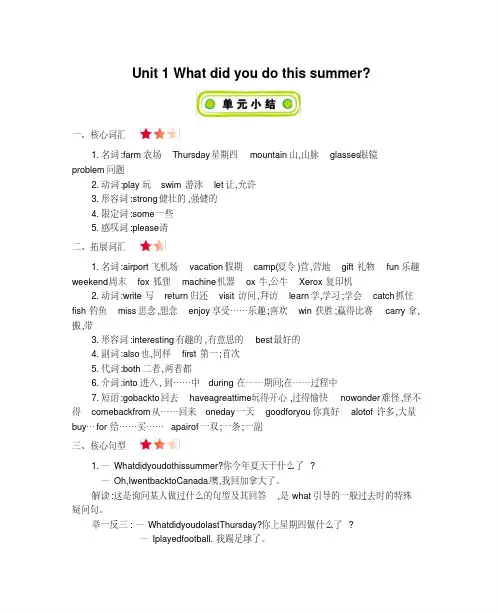
Unit 1 What did you do this summer?一、核心词汇1. 名词:farm 农场Thursday 星期四mountain 山,山脉glasses 眼镜problem 问题2. 动词:play 玩swim 游泳let 让,允许3. 形容词:strong 健壮的,强健的4. 限定词:some 一些5. 感叹词:please 请二、拓展词汇1. 名词:airport 飞机场vacation 假期camp(夏令)营,营地gift 礼物fun 乐趣weekend 周末fox 狐狸machine 机器ox 牛,公牛Xerox复印机2. 动词:write 写return 归还visit 访问,拜访learn 学,学习;学会catch抓住fish 钓鱼miss 思念,想念enjoy 享受……乐趣;喜欢win 获胜;赢得比赛carry 拿,搬,带3. 形容词:interesting 有趣的,有意思的best 最好的4. 副词:also 也,同样first 第一;首次5. 代词:both 二者,两者都6. 介词:into进入, 到……中during 在……期间;在……过程中7. 短语:gobackto 回去haveagreattime 玩得开心,过得愉快nowonder 难怪,怪不得comebackfrom 从……回来oneday 一天goodforyou 你真好alotof 许多,大量buy… for 给……买……apairof 一双;一条;一副三、核心句型1. — Whatdidyoudothissummer? 你今年夏天干什么了?— Oh,IwentbacktoCanada. 噢,我回加拿大了。
解读:这是询问某人做过什么的句型及其回答,是 what 引导的一般过去时的特殊疑问句。
举一反三: — WhatdidyoudolastThursday? 你上星期四做什么了?— Iplayedfootball. 我踢足球了。
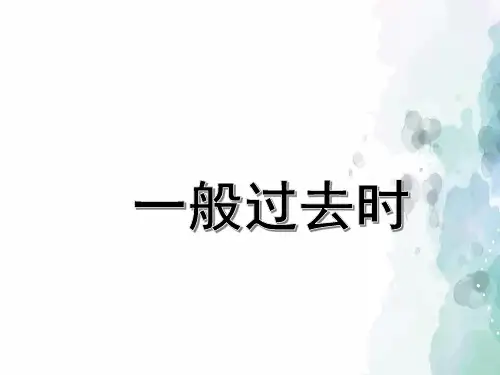
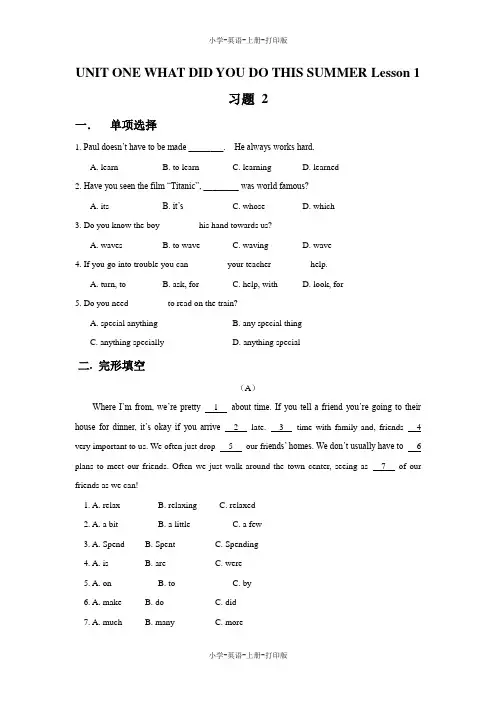
UNIT ONE WHAT DID YOU DO THIS SUMMER Lesson 1习题 2一.单项选择1. Paul doesn’t have to be made ________. He always works hard.A. learnB. to learnC. learningD. learned2. Have you seen the film “Titanic”, ________ was world famous?A. itsB. it’sC. whoseD. which3. Do you know the boy ________ his hand towards us?A. wavesB. to waveC. wavingD. wave4. If you go into trouble you can ________ your teacher ________ help.A. turn, toB. ask, forC. help, withD. look, for5. Do you need ________ to read on the train?A. special anythingB. any special thingC. anything speciallyD. anything special二. 完形填空(A)Where I’m from, we’re pretty 1 about time. If you tell a friend you’re going to their house for dinner, it’s okay if you arrive 2 late. 3 time with family and, friends 4 very important to us. We often just drop 5 our fri ends’ homes. We don’t usually have to 6 plans to meet our friends. Often we just walk around the town center, seeing as 7 of our friends as we can!1. A. relax B. relaxing C. relaxed2. A. a bit B. a little C. a few3. A. Spend B. Spent C. Spending4. A. is B. are C. were5. A. on B. to C. by6. A. make B. do C. did7. A. much B. many C. more(B)Manners(礼貌)are important to happy relations (关系)among people. No one 1 a person with bad manners. A 2 with good manners never laughs at people when they are in trouble. Instead, he 3 to help them. When he asks for something, he says “ 4 . ”And when he receives something, he 5 says “Thank you”. He does not interrupt(打扰) 6 people when they are talking. He does not talk loudly or laugh loudly 7 public. When he sneezes or spits(吐痰), he uses a 8 . If you are late, you 9 make an apology (道歉)to the teacher either at the time 10 after class.1. A. thinks B. likes C. hates D. loves2. A. boy B. man C. person D. give3. A. tries B. wants C. has D. enjoys4. A. Give me B. Please C. Yes D. Hello5. A. never B. sometime C. usually D. still6. A. every B. some C. his D. other7. A. on B. at C. of D. in8. A. book B. cup C. handkerchief D. hand9. A. should B. will C. could D. may10. A. or B. nor C. and D. but参考答案:一.1. B 2. D 3. C 4. B 5.D二.(A)1. C 2. A 3. C 4. A 5. C 6. A 7. B(B)1-5 BCABC 6-10 DDCAA。
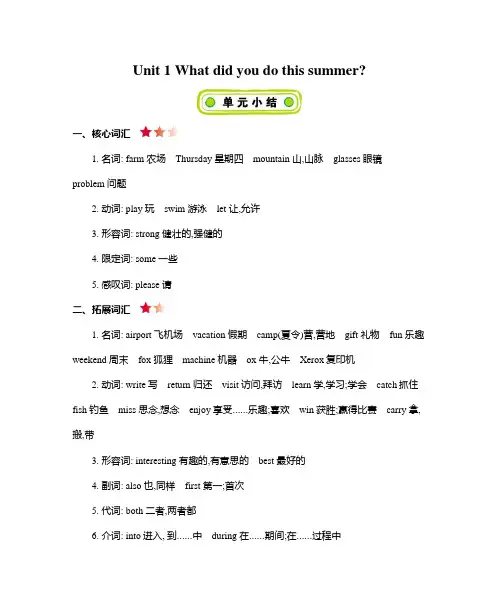
Unit 1 What did you do this summer?一、核心词汇1. 名词: farm 农场Thursday 星期四mountain 山,山脉glasses 眼镜problem 问题2. 动词: play 玩swim 游泳let 让,允许3. 形容词: strong 健壮的,强健的4. 限定词: some 一些5. 感叹词: please 请二、拓展词汇1. 名词: airport 飞机场vacation 假期camp(夏令)营,营地gift 礼物fun 乐趣weekend 周末fox 狐狸machine 机器ox 牛,公牛Xerox复印机2. 动词: write 写return 归还visit 访问,拜访learn 学,学习;学会catch抓住fish 钓鱼miss 思念,想念enjoy 享受……乐趣;喜欢win 获胜;赢得比赛carry 拿,搬,带3. 形容词: interesting 有趣的,有意思的best 最好的4. 副词: also 也,同样first 第一;首次5. 代词: both 二者,两者都6. 介词: into进入, 到……中during 在……期间;在……过程中7. 短语: go back to 回去have a great time 玩得开心,过得愉快no wonder 难怪,怪不得come back from 从……回来one day 一天good for you 你真好 a lot of 许多,大量buy… for 给……买…… a pair of 一双;一条;一副三、核心句型1. — What did you do this summer? 你今年夏天干什么了?— Oh, I went back to Canada. 噢,我回加拿大了。
解读:这是询问某人做过什么的句型及其回答,是 what 引导的一般过去时的特殊疑问句。
举一反三: — What did you do last Thursday? 你上星期四做什么了?— I played football. 我踢足球了。
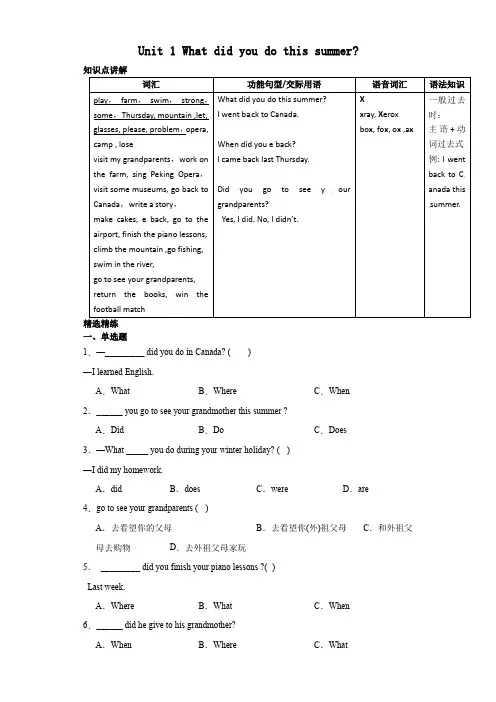
Unit 1 What did you do this summer? 知识点讲解,opera,work on visit some museums, go back tothethe What did you do this summer?I went back to Canada.When did you e back?I came back last Thursday.Did you go to see y ourgrandparents?Yes, I did. No, I didn’t.Xx ray, X eroxbo x, fo x, o x ,a x一般过去时:主语+动词过去式例: I wentback to Canada thissummer.一、单选题1.—_________ did you do in Canada? ()—I learned English.A.What B.Where C.When2.______ you go to see your grandmother this summer ?A.Did B.Do C.Does3.—What _____ you do during your winter holiday? ()—I did my homework.A.did B.does C.were D.are4.go to see your grandparents ()A.去看望你的父母B.去看望你(外)祖父母C.和外祖父母去购物D.去外祖父母家玩5._________ did you finish your piano lessons ?()Last week.A.Where B.What C.When6.______ did he give to his grandmother?A.When B.Where C.What7.Lucy often _____ her homework on Sunday, but last Sunday she _____ her bike. () A.did; cleaned B.does; cleaned C.does; cleaning D.did; cleans 8.I climbed the mountain and I _____ in the river. ()A.swam B.swim C.swimming D.swims 二、根据字母/中文提示完成单词9.用所给单词的适当形式填空。
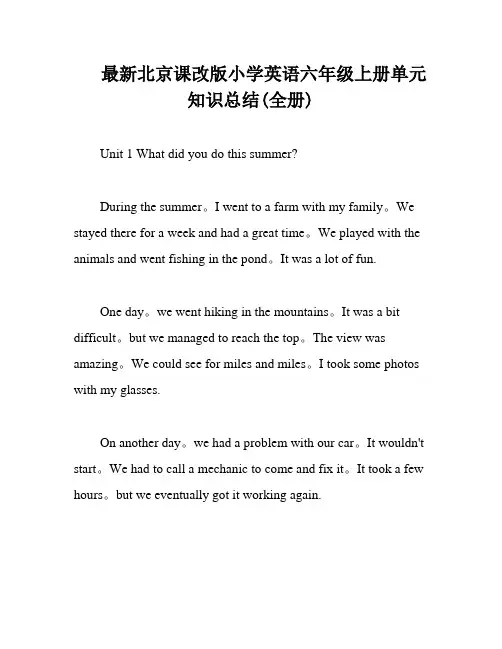
最新北京课改版小学英语六年级上册单元知识总结(全册)Unit 1 What did you do this summer?During the summer。
I went to a farm with my family。
We stayed there for a week and had a great time。
We played with the animals and went fishing in the pond。
It was a lot of fun.One day。
we went hiking in the mountains。
It was a bit difficult。
but we managed to reach the top。
The view was amazing。
We could see for miles and miles。
I took some photos with my glasses.On another day。
we had a problem with our car。
It wouldn't start。
We had to call a mechanic to come and fix it。
It took a few hours。
but we eventually got it working again.Overall。
it was a really enjoyable n。
I learned a lot about farm life and nature。
I also got to spend some quality time with my family.I came back from n feeling refreshed and happy。
I'm already looking forward to next year's trip!biscuit5.介词:with和,带着三、课文解析及改写本单元主要讲述了小女孩Lucy在踢足球时不小心受伤,并被送到医院检查的故事。
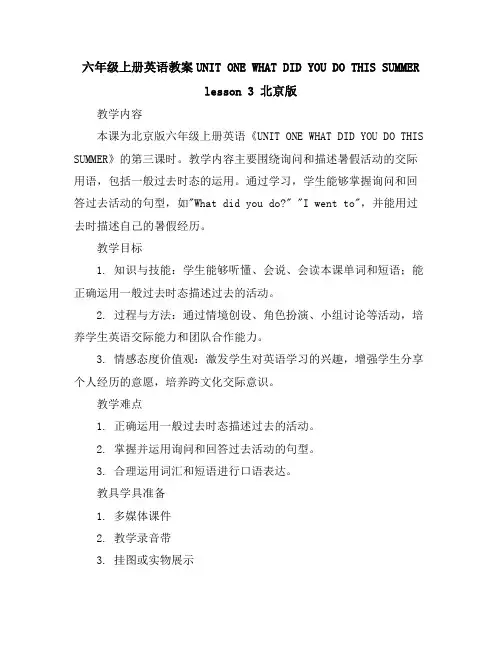
六年级上册英语教案UNIT ONE WHAT DID YOU DO THIS SUMMERlesson 3 北京版教学内容本课为北京版六年级上册英语《UNIT ONE WHAT DID YOU DO THIS SUMMER》的第三课时。
教学内容主要围绕询问和描述暑假活动的交际用语,包括一般过去时态的运用。
通过学习,学生能够掌握询问和回答过去活动的句型,如"What did you do?" "I went to",并能用过去时描述自己的暑假经历。
教学目标1. 知识与技能:学生能够听懂、会说、会读本课单词和短语;能正确运用一般过去时态描述过去的活动。
2. 过程与方法:通过情境创设、角色扮演、小组讨论等活动,培养学生英语交际能力和团队合作能力。
3. 情感态度价值观:激发学生对英语学习的兴趣,增强学生分享个人经历的意愿,培养跨文化交际意识。
教学难点1. 正确运用一般过去时态描述过去的活动。
2. 掌握并运用询问和回答过去活动的句型。
3. 合理运用词汇和短语进行口语表达。
教具学具准备1. 多媒体课件2. 教学录音带3. 挂图或实物展示4. 学生用书和练习册5. 小组活动卡片教学过程1. 导入:通过展示一些暑假活动的图片,引导学生回顾暑假经历,激发学习兴趣。
2. 新课呈现:利用多媒体展示本课的主要句型和词汇,教师领读并进行解释。
3. 情境练习:学生分角色扮演,模拟对话场景,练习询问和回答过去活动的句型。
4. 小组合作:学生分组讨论,分享各自的暑假经历,并用英语进行汇报。
5. 巩固提高:通过听录音、朗读课文、完成练习等方式,巩固所学知识。
板书设计板书设计要简洁明了,突出本课重点。
包括主要句型、关键词汇、语法点等。
作业设计1. 朗读课文,熟记本课单词和短语。
2. 完成练习册相关练习题。
3. 小组合作,编写一段关于暑假活动的对话,下节课进行展示。
课后反思本教案旨在为教师提供一个清晰、严谨、流畅的教学框架,帮助教师有效地组织和实施课堂教学,确保教学目标的达成。
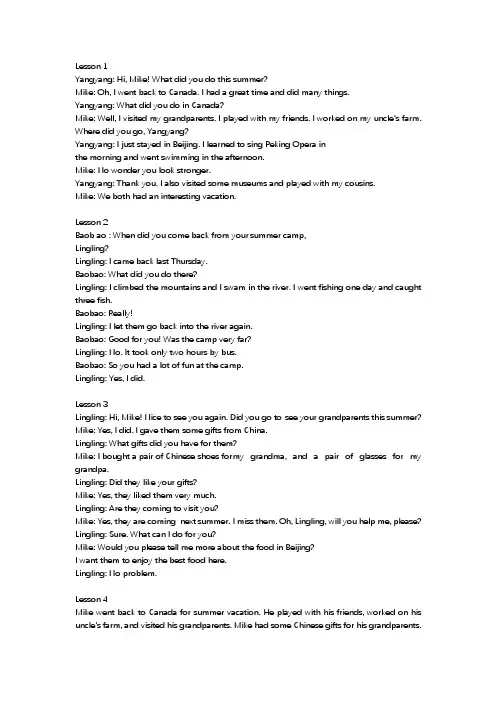
Lesson 1Yangyang: Hi, Mike! What did you do this summer?Mike: Oh, I went back to Canada. I had a great time and did many things.Yangyang: What did you do in Canada?Mike: Well, I visited my grandparents. I played with my friends. I worked on my uncle's farm. Where did you go, Yangyang?Yangyang: I just stayed in Beijing. I learned to sing Peking Opera inthe morning and went swimming in the afternoon.Mike: No wonder you look stronger.Yangyang: Thank you. I also visited some museums and played with my cousins.Mike: We both had an interesting vacation.Lesson 2Baob ao : When did you come back from your summer camp,Lingling?Lingling: I came back last Thursday.Baobao: What did you do there?Lingling: I climbed the mountains and I swam in the river. I went fishing one day and caught three fish.Baobao: Really!Lingling: I let them go back into the river again.Baobao: Good for you! Was the camp very far?Lingling: No. It took only two hours by bus.Baobao: So you had a lot of fun at the camp.Lingling: Yes, I did.Lesson 3Lingling: Hi, Mike! Nice to see you again. Did you go to see your grandparents this summer? Mike: Yes, I did. I gave them some gifts from China.Lingling: What gifts did you have for them?Mike: I bought a pair of Chinese shoes for m y grandma, and a pair of glasses for my grandpa.Lingling: Did they like your gifts?Mike: Yes, they liked them very much.Lingling: Are they coming to visit you?Mike: Yes, they are coming next summer. I miss them. Oh, Lingling, will you help me, please? Lingling: Sure. What can I do for you?Mike: Would you please tell me more about the food in Beijing?I want them to enjoy the best food here.Lingling: No problem.Lesson 4Mike went back to Canada for summer vacation. He played with his friends, worked on his uncle's farm, and visited his grandparents. Mike had some Chinese gifts for his grandparents.They liked the gifts very much.Yangyang stayed in Beijing for the summer. He learned to sing Peking Opera in the morning and went swimming in the afternoon. He looks stronger. They both had a lot of fun.Read and answer.What did Mike do this summer?。
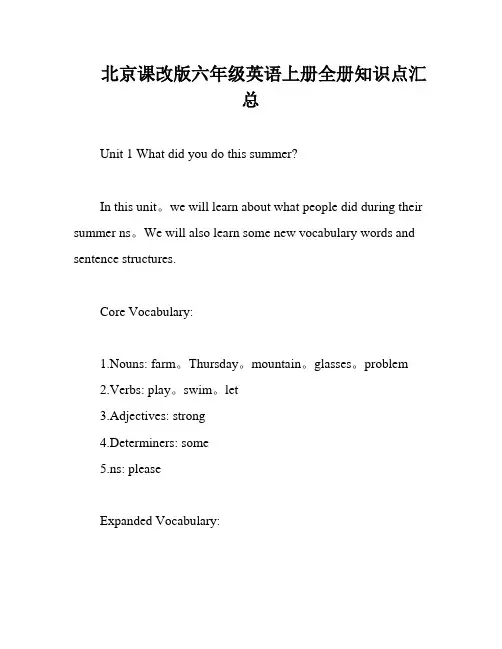
北京课改版六年级英语上册全册知识点汇总Unit 1 What did you do this summer?In this unit。
we will learn about what people did during their summer ns。
We will also learn some new vocabulary words and sentence structures.Core Vocabulary:1.Nouns: farm。
Thursday。
mountain。
glasses。
problem2.Verbs: play。
swim。
let3.Adjectives: strong4.Determiners: some5.ns: pleaseExpanded Vocabulary:1.Nouns: airport。
n。
camp。
gift。
fun。
weekend。
fox。
machine。
ox。
Xerox2.Verbs: write。
return。
visit。
learn。
catch。
fish。
miss。
enjoy。
win。
carry3.Adjectives: interesting。
best4.Adverbs: also。
first5.Pronouns: both6.ns: into。
during7.Phrases: go back to。
have a great time。
no wonder。
come back from。
one day。
good for you。
a lot of。
buy for。
a pair ofCore Sentence Structures:1."What did you do this summer?" - This is a common n to ask about someone's summer activities。
It is a special interrogative sentence in the past tense.Example: "Oh。
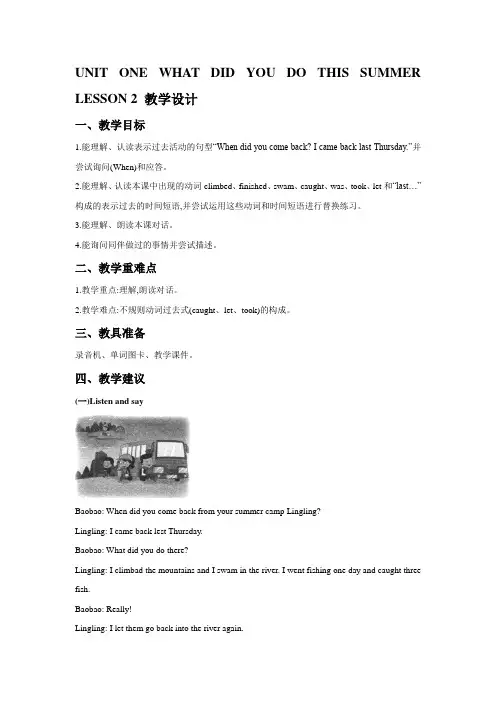
UNIT ONE WHAT DID YOU DO THIS SUMMER LESSON 2 教学设计一、教学目标1.能理解、认读表示过去活动的句型“When did you come back? I came back last Thursday.”并尝试询问(When)和应答。
2.能理解、认读本课中出现的动词climbed、finished、swam、caught、was、took、let和“last…”构成的表示过去的时间短语,并尝试运用这些动词和时间短语进行替换练习。
3.能理解、朗读本课对话。
4.能询问同伴做过的事情并尝试描述。
二、教学重难点1.教学重点:理解,朗读对话。
2.教学难点:不规则动词过去式(caught、let、took)的构成。
三、教具准备录音机、单词图卡、教学课件。
四、教学建议(一)Listen and sayBaobao: When did you come back from your summer camp Lingling?Lingling: I came back lest Thursday.Baobao: What did you do there?Lingling: I climbad the mountains and I swam in the river. I went fishing one day and caught three fish.Baobao: Really!Lingling: I let them go back into the river again.Baobao: Good for you! Was the camp very far?Linging: No. It took only two hours by bus.Baobao: So you had a lot of fun at the campLingling: Yes, I did.分析与提示·本部分继续学习一般过去时的表达方式。
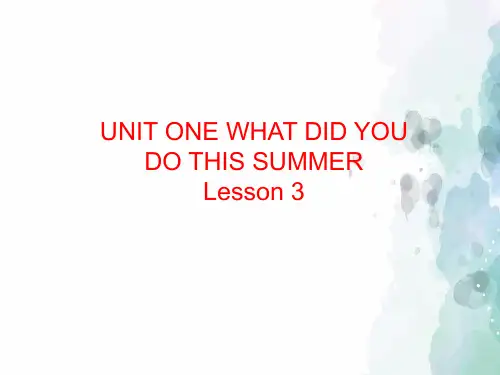
教学目标1。
能理解、认读表示过去活动的句型“when did you come back?Icame back last Thur sday."2.能理解、认读本课中出现的动词clombed、finished、swam、caught、was、took、let 和”last…”构成的表示过去的时间短语,并尝试运用这些东西和时间短语进行替换练习。
3.能理解、朗读本课对话。
4.能询问同伴做过的事情并尝试描述。
学时重点教学重点:理解、朗读对话。
学时难点教学难点:不规则动词过去式的构成。
教学活动1【导入】通过询问学生假期活动导入本课内容1.Ask:what did you do this summer? When did you come back?2.Did you have a summer camp? 出示夏令营图片帮助学生理解camp3.If you take part in the summer camp, what will you do?2【讲授】通过讲解和游戏理解本课对话1.出示夏令营活动照片和英文单词、词组。
(学生朗读)Lingling went to the summer camp in this summer vacation,when did she come back?et’s watch the flash.(观看动画,理解故事大意并回答问题)what did Lingling do in the summer camp ?please read the dialogue by yourselves and u se your pencil to under line the answer.(she climbed the mountain, swam in the river , went fishing, caught three fish)Was the camp very far?(No,it took only two hours by bus)3.group game(start)what did Lingling do this summer?She went to s summer camp. What did she do there?She climbed mountains. Where did she catch the fish?She caught fish in the river. How many fish did she catch?She caught three. Did she let the fish go?Yes,she did.(Finish)把句子印到A4纸上,横向剪开,放到信封里。
单元整体思路本单元涵盖三个连续发生的对话语篇,学习情境都是围绕讨论自己和对方的假期生活展开,但每个对话谈论话题侧重点不同。
通过学习三个语篇对话及阅读拓展语篇,学生能对假期生活的内容更加清晰,并在谈论自己或他人的假期生活中中体验生活的美好。
本单元由 4 课时组成,单元主题为“My Summer Holiday”课时内容设计如下:单元教学目标:1.能够听懂、理解本单元三个对话的内容,以暑假生活为核心展开会话。
2.能用一般过去时简单询问,描述过去发生的事。
3.能够听懂、认读相关动词的过去式,并能在相应情景中运用。
4.学生能通过对话学习,获取、梳理并表达如何正确使用一般过去时态,根据暑假的各种活动与他人进行交流。
5.能用思维导图梳理暑假生活的各个方面,养成归纳总结的好习惯。
6.能向主人公Mike和Lingling学习,增强主动关心老人、热爱生活并爱护小动物的责任感,加强同学间交流,做到互相关心的意识。
教学目标:1.能理解、认读表示询问过去活动的句型:What did you do this summer? I wentback to Canada. 以及询问以往去过地方的句型:Where did you go? I went to…2.能理解、认读本课中出现的动词及过去式,尝试运用这些动词进行替换练习。
3.能理解、朗读本课对话,并能询问同伴暑期活动及尝试描述4.能用思维导图梳理暑假生活有关What和Where两方面的内容,并逐步进行完善。
教学重点:1.本课对话的朗读及理解2.规则动词过去式的构成教学难点:句型No wonder you look stronger. 理解教学过程时间教学环节主要师生活动2’45 6’30WarmingupPresentation1. Activity 1: Greetings教师进行自我介绍和单元介绍。
2. Activity 2: Let’s talk教师呈现五年级下所学有关暑假的内容,进行衔接并与学生交流,引出主题。
Unit 1 What did you do this summer?
一、核心词汇
1. 名词: farm 农场Thursday 星期四mountain 山,山脉glasses 眼镜problem 问题
2. 动词: play 玩swim 游泳let 让,允许
3. 形容词: strong 健壮的,强健的
4. 限定词: some 一些
5. 感叹词: please 请
二、拓展词汇
1. 名词: airport 飞机场vacation 假期camp(夏令)营,营地gift 礼物fun 乐趣weekend 周末fox 狐狸machine 机器ox 牛,公牛Xerox复印机
2. 动词: write 写return 归还visit 访问,拜访learn 学,学习;学会catch抓住fish 钓鱼miss 思念,想念enjoy 享受……乐趣;喜欢win 获胜;赢得比赛carry 拿,搬,带
3. 形容词: interesting 有趣的,有意思的best 最好的
4. 副词: also 也,同样first 第一;首次
5. 代词: both 二者,两者都
6. 介词: into进入, 到……中during 在……期间;在……过程中
7. 短语: go back to 回去have a great time 玩得开心,过得愉快no wonder 难怪,怪不得come back from 从……回来one day 一天good for you 你真好 a lot of 许多,大量buy… for 给……买…… a pair of 一双;一条;一副
三、核心句型
1. — What did you do this summer? 你今年夏天干什么了?
— Oh, I went back to Canada. 噢,我回加拿大了。
解读:这是询问某人做过什么的句型及其回答,是 what 引导的一般过去时的特殊疑问句。
举一反三: — What did you do last Thursday? 你上星期四做什么了?
— I played football. 我踢足球了。
2. — When did you come back from your summer camp, Lingling?玲玲,你什么时候从夏令营回来的?
— I came back last Thursday. 我上星期四回来的。
解读: 此句是 when引导的一般过去时的特殊疑问句,用来询问某人什么时候做过某事。
举一反三: — When did you write the story? 你什么时候写的这个故事?
— Last weekend. 上周末。
3. I let them go back into the river again. 我又把它们放回河里了。
解读: 这是描述让某人做某事的句型。
举一反三: Can you let me drink some orange juice? 能让我喝些橙汁吗?
4. — Did you go to see your grandparents this summer? 今年夏天你去看望你的祖父母了吗?
— Yes, I did. 是的,我去了。
解读: 此句是一般过去时的一般疑问句及其回答。
举一反三: — Did you climb mountains? 你去爬山了吗?
— No, I didn’t. 不,我没有。
四、了解句型
1. — Was the camp very far? 营地很远吗?
— No. 不远。
解读: 这是由 be 动词引导的一般过去时的一般疑问句。
2. — Are they coming to visit you? 他们要来看你吗?
— Yes, they are coming next summer.是的,他们明年夏天来。
解读: come, go, leave等表示位移的词,可用现在进行时表将来。
3. What can I do for you? 我能为你做点什么?
解读: 这是表示提供帮助的句子。